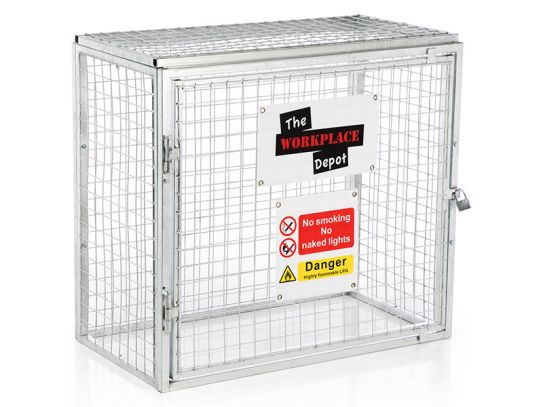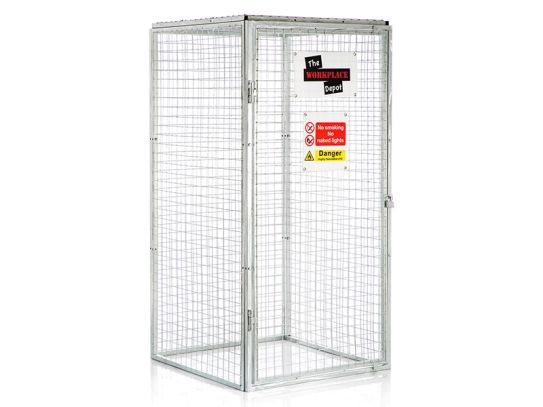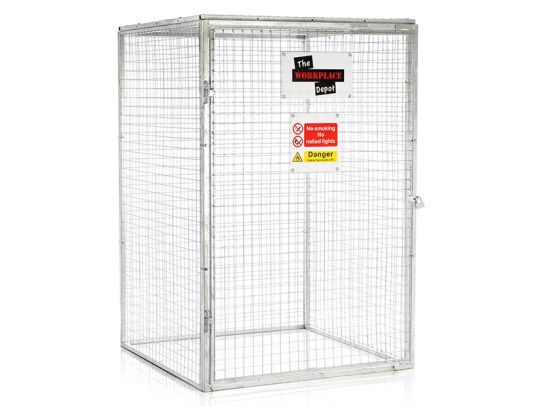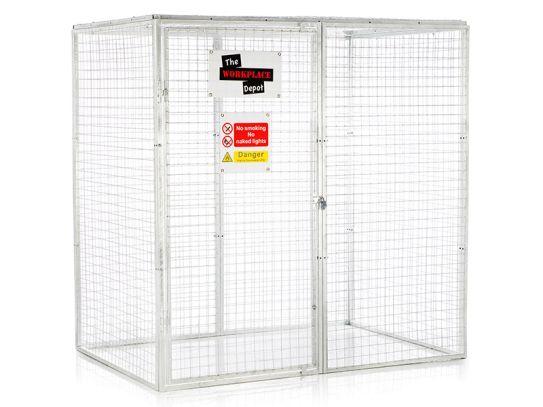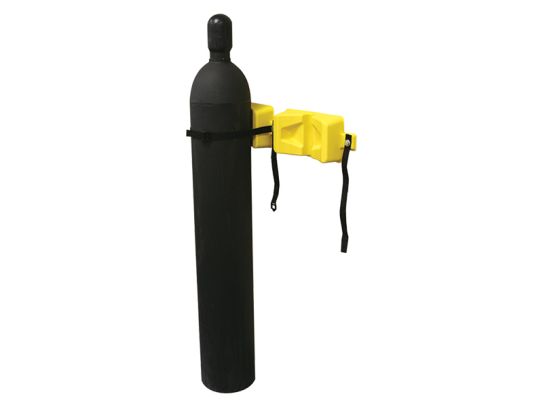Gas Cylinder Storage
Protect Your Gas Cylinders With Our Storage Solutions
Say goodbye to cluttered and unsafe gas cylinder storage. With our gas cylinder storage units, you can keep your gas cylinders organised, easily accessible, and protected from potential hazards. Our units are made of high-quality materials and are built to last, so you can trust that your gas cylinders will be safe and secure.
What Are Gas Cylinder Cages?
A gas cylinder cage is a type of storage device designed to safely and securely hold gas cylinders, such as those used for welding or other industrial purposes. These cages are typically made of metal, such as steel or aluminium, and are designed to be strong and durable. They often have a locking mechanism to prevent unauthorised access to the gas cylinders, and may also be equipped with additional safety features, such as ventilation or fire suppression systems. Gas cylinder cages are used to help prevent accidents and injuries, and to ensure that gas cylinders are stored in a safe and controlled manner.
What Are Gas Cylinder Cages And Stands?
A gas cylinder cage is a type of storage device designed to safely and securely hold gas cylinders, such as those used for welding or other industrial purposes. A gas cylinder stand, on the other hand, is a type of support structure that is used to hold gas cylinders in place and prevent them from falling over or being knocked over. Gas cylinder stands can be used in conjunction with gas cylinder cages, or they may be used on their own.
What Are The Different Types Of Gas Cylinder Storage?
There are several different types of gas cylinder storage, including:
- Gas cylinder cages: These are metal enclosures designed to securely hold gas cylinders and prevent unauthorised access.
- Gas cylinder stands: These are support structures that hold gas cylinders in place and prevent them from falling over.
- Gas cylinder cabinets: These are enclosed storage units that are specifically designed to hold gas cylinders. They are often made of metal and have locking mechanisms to prevent unauthorised access.
- Gas cylinder racks: These are storage systems that allow gas cylinders to be stored vertically, rather than on their sides. They are often used in situations where space is limited.
- Gas cylinder lockers: These are enclosed storage units that are specifically designed to hold gas cylinders. They are often made of metal and have locking mechanisms to prevent unauthorised access.
What Are The Key Features To Consider When Choosing Gas Cylinder Storage?
When choosing gas cylinder storage, there are several key features to consider, including:
- Size and capacity: Make sure that the storage unit is large enough to hold the number of gas cylinders you need to store, and that it is capable of supporting the weight of the cylinders.
- Durability and sturdiness: The storage unit should be made of strong, durable materials that can withstand regular use and the weight of the gas cylinders.
- Safety features: Look for storage units that have safety features such as locking mechanisms and ventilation to prevent accidents and injuries.
- Ease of access: Consider whether the storage unit allows for easy access to the gas cylinders, while also providing sufficient security to prevent unauthorised access.
- Compliance with regulations: Make sure that the storage unit complies with any relevant safety regulations, such as those related to the storage of flammable materials.
How Do I Maintain My Gas Cylinder Storage?
Here are some tips for maintaining your gas cylinder storage:
- Regularly inspect the storage unit for signs of damage or wear, and make any necessary repairs or replacements.
- Keep the storage unit clean and free of debris or other materials that could interfere with the safe storage of the gas cylinders.
- Make sure that the storage unit is properly ventilated, and that any safety features, such as fire suppression systems, are working properly.
- Follow the manufacturer's instructions for the proper use and maintenance of the storage unit.
- Keep the area around the storage unit clear of flammable materials or other potential hazards.
- Regularly check the gas cylinders themselves for signs of damage or leaks, and replace or repair them as needed.
- Follow all relevant safety regulations and guidelines for the storage of gas cylinders.
Are There Any Environmental Benefits Associated With Using Gas Cylinder Storage?
Using proper gas cylinder storage can help to protect the environment and promote sustainability in several ways. For example:
- Proper storage can prevent gas cylinders from leaking or being damaged, which can help to reduce the amount of harmful gases and chemicals that are released into the environment.
- By preventing unauthorised access to gas cylinders, proper storage can help to prevent accidents and injuries that could have negative environmental consequences.
- Gas cylinder storage can help to keep gas cylinders organised and easy to access, which can reduce the amount of time and energy needed to locate and use them. This can help to reduce greenhouse gas emissions and other environmental impacts.
- Gas cylinder storage can help to extend the life of gas cylinders by protecting them from damage, which can reduce the need for frequent replacements and the associated environmental impacts of manufacturing and disposing of new cylinders.
Are There Any Special Considerations When Choosing Gas Cylinder Storage For A Particular Environment?
Yes, there are several special considerations to keep in mind when choosing gas cylinder storage for a particular environment or application. Some examples include:
- The type of gas being stored: Different gases have different properties and may require different types of storage. For example, flammable gases may require specialised storage units with fire suppression systems, while corrosive gases may require storage units made of materials that are resistant to corrosion.
- The location of the storage unit: The storage unit should be located in a safe and convenient location that is easily accessible to authorised users. It should also be located in an area that is not prone to flooding or other environmental hazards.
- The size and capacity of the storage unit: The storage unit should be large enough to hold the number of gas cylinders you need to store, and should be able to support their weight.
- The specific regulations and guidelines that apply: Make sure that the storage unit complies with all relevant regulations and guidelines, such as those related to the storage of flammable materials.
- The potential hazards associated with the gas being stored: Consider the potential hazards associated with the gas being stored, such as the risk of explosion or fire, and choose a storage unit that is equipped with appropriate safety features.
Are There Any EU Or UK Standards That Affect Gas Cylinder Storage?
Yes, there are several EU and UK standards that affect gas cylinder storage. Some examples include:
- The European standard EN 14427: This standard specifies the requirements for the design, construction, and testing of gas cylinder storage units. It applies to storage units that are intended to hold gas cylinders with a maximum nominal water capacity of 150 litres or less.
- The British standard BS EN 14427: This standard is based on the European standard EN 14427, and specifies the requirements for the design, construction, and testing of gas cylinder storage units in the UK.
- The British standard BS 7244: This standard provides guidance on the safe storage and handling of gas cylinders in the UK. It covers a range of issues, including the types of gas cylinders that can be stored, the design and construction of storage units, and the procedures for handling and transporting gas cylinders.
- The UK Health and Safety Executive's Approved Code of Practice (ACOP) for the Safe Use of Gas Cylinders: This ACOP provides detailed guidance on the safe use of gas cylinders in the UK, including the storage of gas cylinders. It covers a range of issues, including the types of gas cylinders that can be stored, the design and construction of storage units, and the procedures for handling and transporting gas cylinders.
